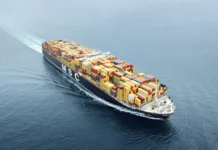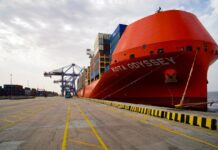
In more than 30 years, the domain of the container shipping alliances has always been exclusively on mainliner, deep-sea services, with individual carrier members operating their own feeder services.
Sea-Intelligence notes that the newly launched Gemini Cooperation has taken a different approach to their alliance network design, incorporating a hub-and-spoke model within their formal alliance, with fewer mainliner calls and an increased focus on transshipment via shuttles.
The two partners, Maersk and Hapag-Lloyd, have said the Gemini shuttle network, when fully rolled out, will include 28 shuttle services, 15 of which have already commenced since February 2025. Of those, 10 were deployed in Asia, two in Europe, and three in the Indian Subcontinent/Middle East.
Overall, the schedule reliability for the Gemini shuttle services was 98.4% in February. Notably, all but two shuttle services, A04 and A09 (both deployed in Asia), had 100% schedule reliability, according to the Sea-Intelligence report.

However, the true performance test of the new alliances – and MSC’s standalone new network – will be when they are fully rolled out in July 2025.
“During the roll-out phase, the first month is likely to be the least challenging, as only a small subset of vessels will be phased into the new network, while the later roll-out months are traditionally more challenging, as many vessels are phasing in at the same time,” explains Alan Murphy, CEO of Sea-Intelligence, a Danish maritime data analysis firm.
The report adds that we only have February scores for 15 of the 28 planned Gemini shuttle services, and while the number of arrivals for the 15 services is significant, only a small subset of European shuttles had been launched in February.
Thirdly, none of the Gemini mainliner services made connections from origin to destination regions (e.g., from Asia to Europe) in February, as it takes more than a month to make such connections.
“The Gemini shuttles have thus ‘only’ been feeding the mainliner services in February and are yet to receive containers from mainliners to be shipped to the final discharge port,” pointed out Murphy, who though noted, “That said, even if it is still very early days, it is still an impressive first performance.”





